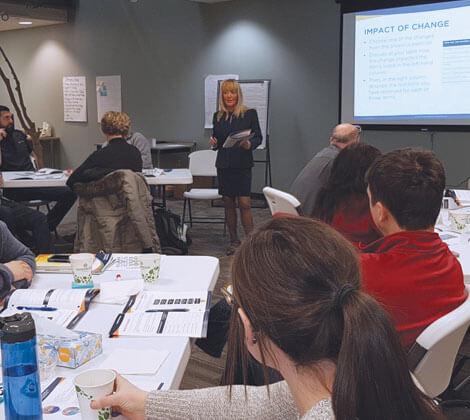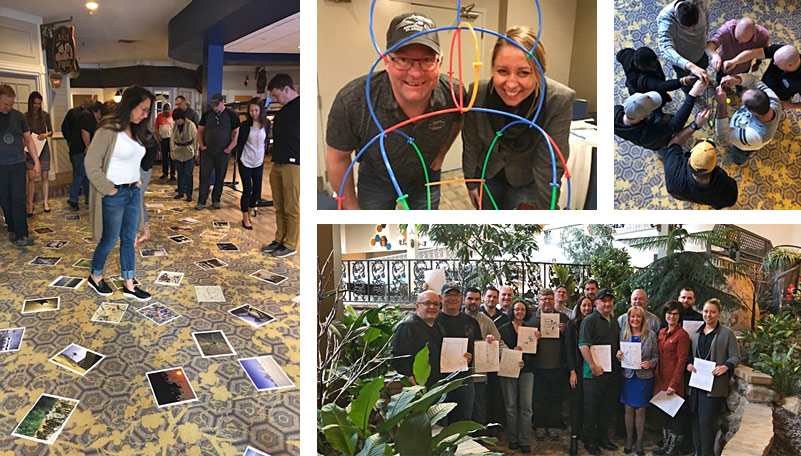
Front Line Leadership
Front Line Leadership
Develop & Refine Supervisory Training Skills
Front Line Leadership is a flexible, 10-module program that provides supervisors with a toolkit of practical communication and employee development tools that reduce conflict, improve employee performance, and enhance team effectiveness. Leaders learn to deliver clear direction, coach employees, and provide effective feedback. The ultimate goal of the training is to enable leaders to create work environments that foster employee engagement, improve performance, and increase employee satisfaction.

Format
Ten modules that can be offered in any combination. Each module targets a specific set of leadership skills, which when combined, addresses many of the competencies all frontline leaders need.
In-person or web-based formats available.
Target Audience
All current, new or aspiring supervisors and managers; high potentials, leads, or foremen responsible for directing the work of others.


Recommended Group Size
8-20 Participants.
Sustaining Learning – putting the skills to work
One of the key features of the FLL process is a set of ten structured activities that help participants apply what they have learned in training back on the job. The activities are integrated into the training as “between session” assignments. These assignments are designed to reinforce learning and transfer knowledge to the entire team.
Format
Ten modules that can be offered in any combination. Each module targets a specific set of leadership skills, which when combined, addresses many of the competencies all frontline leaders need.
In-person or web-based formats available.
Target Audience
All current, new or aspiring supervisors and managers; high potentials, leads, or foremen responsible for directing the work of others.
Recommended Group Size
8-20 Participants.
Sustaining Learning – putting the skills to work
One of the key features of the FLL process is a set of ten structured activities that help participants apply what they have learned in training back on the job. The activities are integrated into the training as “between session” assignments. These assignments are designed to reinforce learning and transfer knowledge to the entire team.
Front Line Modules
|
Role of the Leader
Get in touch with the qualities, skills, and traits required of a highly effective leader.
|
| Learners get in touch with the qualities, skills, and traits required of highly effective leaders. They complete a self-assessment to identify their current leader skill level and experience the impact that poor leadership has on the effectiveness of the team. |
|
Managing Different Personalities
Understand personality and communication differences through a new model and developing an appropriate language.
|
| This session introduces a model and language for understanding personality and communication differences while providing clear and practical tools for adapting communication to be more effective in the workplace. Based on the Everything DiSC® profile, participants will gain valuable insight into their own style while developing strategies for working with styles different than their own. |
|
Motivating & Engaging Employees
A close look at the psychology surrounding motivation to ensure peak performance from employees.
|
| Learners analyze the current level of engagement in their organization and identify potential causes of disengagement. Leaders will use this information to brainstorm interventions to help improve the engagement and satisfaction on their teams. |
|
Teamwork & Collaboration
Engage in team activities that require effective communication, collaboration, and problem solving skills.
|
| This interactive session allows participants to experience teamwork through various activities requiring effective communication, dialogue, and problem-solving skills. Leaders will assess their team’s current strengths and weaknesses and then learn a model for improving performance based on six key elements for developing effective teams. |
|
Communication Effectiveness
Learn the core skills of attentive listening, providing quality feedback, and giving praise and recognition.
|
|
Managing Performance I
Understand what causes poor performance and how to manage using clear instructions.
|
| Individual contributors need a specific understanding of what is expected by the leader, not only in how they perform certain tasks but also how they are to behave and act within their role on the team. This session provides activities and tools for clearly communicating what is expected on the job, as well as ways to provide ongoing feedback and monitoring of performance. |
|
Managing Performance II
Develop a blueprint to manage employee development through efficient time management.
|
| One of the challenges many leaders face is identifying who to give their time to. It’s not always possible to give every person on the team the same amount of attention. Having a clear blueprint for managing employee developmental needs helps leaders better utilize their time and energy. |
|
Coaching for Commitment
Learn effective techniques and behaviours needed to conduct coaching conversations.
|
| This session provides a framework for how to conduct a coaching conversation with someone whose performance is below standards. Leaders will explore the behaviors needed for effective coaching, view examples of effective and ineffective coaching techniques, and use a structured process for planning for a coaching conversation. |
|
Managing Conflict
Manage conflict and improve workplace morale with effective strategies and techniques.
|
| Conflict is a normal part of the workplace. When it is handled appropriately, conflict can result in better solutions and effective problem solving. When conflict is destructive, it has the potential for negatively impacting team cohesion, group morale, and engagement levels within the organization. This session provides clear strategies and techniques for effectively managing conflict on the team. |
|
Managing Change
Understand staff reactions to change and how to align them to support your organization.
|
| It is important for new leaders to understand the emotional reaction employees have to change and how to best manage those reactions while supporting the direction of the organization. This session provides an overview on the impact of change within an organization and tools for best planning for and conducting a change conversation with the team. |
Certification
Available for in-house facilitators and consists of Everything DiSC® Train the Trainer and Front Line Certification. A pilot program may be scheduled for up to 20 participants.

Front Line Leadership Testimonials
Here are a few of our recent testimonials for Front Line Leadership.
Visit our testimonials page here for more!
Program Options
Tap/hover below to learn more:
"*" indicates required fields




